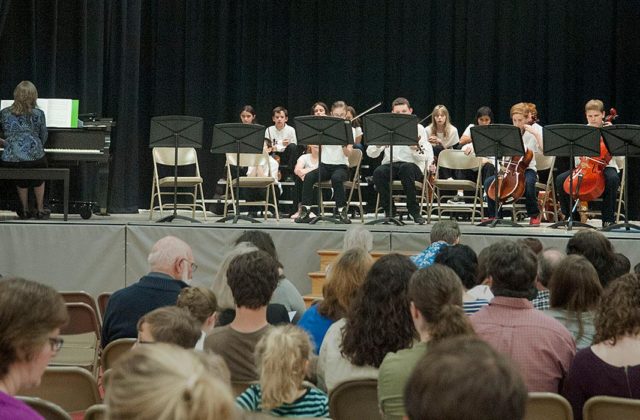Following Budget Cuts, School Board Decides to Cut Botelle School’s Strings Program
Liz Allyn Is Resigning as Music Teacher
By Ruth Melville
In response to a combination of rising expenses and a decreasing budget, the Norfolk Board of Education has decided to eliminate the strings part of music education at Botelle School.
Until the upcoming school year, all Botelle students had, at the music teacher’s discretion, access to basic instruction on the violin. Second graders completed a basic pizzicato and bowing unit on open strings, and students in grades 4, 5 and 6 could choose violin or cello as an elective. Botelle has been unusual among public elementary schools in having a strings program, but this is a luxury that the school board has decided it can no longer afford to maintain.
School superintendent Mary Beth Iacobelli says the vote to eliminate the strings program was taken reluctantly. “The board is heartbroken” at having to cut the program, she says, “and I personally am distraught, but our backs were up against the wall.”
According to Iacobelli, the school budget was already flat-funded when she arrived four years ago, and there has been less money every year since. This year she cut over $100,000, leaving the school still $20,000 over budget. The town opted to take over the some of the costs of operating the facility (heaters, electrical updates, flooring), which enabled the board to adopt a budget with a 0 percent increase. “But then,” the superintendent says, “the town directed the board to make $40,000 more in cuts.”
Iacobelli explains that “only 5 to 10 percent of our budget is discretionary—things like instructional supplies, software licenses, professional development—and there’s not that much room to cut.” There were some retirements this year, but the resulting savings were not enough to balance increased expenses, resulting largely from union-negotiated staff raises, purchased services and increases in special education costs. “It costs us around $90,000 to provide tuition and transport for just one special ed student.”
“What can we legally cut?” she asks. “We’ve gone from two classes down to one in each grade. I couldn’t cut a teacher, and most of our programming is mandated by law.” The school already cut its Spanish program two years ago.
In the end, she says, the board decided that “eliminating the strings program had the highest leverage. Last year there were only eight students in the program, and since there is no strings program at Regional 7, there was no way for them to move forward. We could make the cut with the least impact on students and instruction.”
“You can only cut a little here, a little there, before there are no other nooks and crannies to go,” she adds. “And there were no viable suggestions from the town or the citizens.”
Lauren Valentino, principal of the school, is distressed that the situation has come to this point. “It’s never an easy thing to do when you have to cut programs,” she says. “It’s one of those unfortunate things, and I’m very sad about it. The program was unique to Botelle.”
At the same time, she’s hopeful that “we can rally around to bring it back into the budget in the future.” Noting that the school still owns the instruments—around 20 violins and four cellos—she mentions the option of offering strings as an afterschool program.
Iacobelli knows that the decision will be unpopular. At the last school board meeting, Charles Fidlar, a former conductor and music professor, spoke against the decision. “Among the most important experiences in a child’s early education are singing and playing an instrument, especially one of the string family. One only has to Google ‘Playing a violin and brain development’ to realize that canceling the Botelle string program is a huge mistake.”
Another major loss for the school’s music program is the retirement of Elizabeth Allyn, who for the past 15 years has been the general music, chorus and strings teacher. Even before the decision to cut the strings program was announced, Allyn was troubled that her time with the students was steadily being reduced. Her position was reduced from six-tenths to five-tenths—her replacement will be only a three-tenths position—and scheduling requirements made it impossible to make up missed classes. “I believe everyone was trying to do the right thing by their own assessment,” she says, “but I felt there was not enough music time for the kids.” Like Valentino, she has hopes for an afterschool program in strings.
Valentino has the highest praise for Allyn. “It’s not going to be easy to find a replacement for her—there simply isn’t one. She’s a phenomenal person, an amazing teacher. She will be missed.”
This fall Iacobelli plans to set up a forum, starting with families with children in the school but expanding to the whole community, to discuss issues at the school. She wants the public to understand “how and why we make the decisions we do.” She also urges people to attend the Board of Finance meetings, Board of Education meetings, and the town budget meetings. “It doesn’t do any good to be upset after the fact. People need to be more proactive.”
Photo, top, of the Botelle strings orchestra, by Bruce Frisch.

